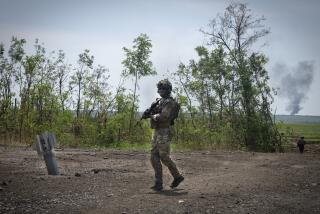U.S. Forces Find Enemy Tougher Than Expected
- Share via
EASTERN SAUDI ARABIA — After the first days of direct skirmishes with Iraqi troops along the Saudi-Kuwaiti border, including a 36-hour Iraqi occupation of the Saudi border city of Khafji, some U.S. forces are substantially reassessing their view of the opposition.
Though allied forces crushed the Iraqi incursions and reportedly inflicted heavy casualties, many of the soldiers who waged the initial ground war say the enemy they fought was not the tired, demoralized, frightened army they expected to encounter.
Instead, many U.S. forces now are saying they expect the Iraqi army to put up a substantial fight. And the ground war that now seems inevitable, they say, could span not weeks but months.
“It would be great if they folded,” said Marine Maj. Michael Steele, 36, of Camp Pendleton, Calif., whose Cobra helicopter gunship helped knock out six Iraqi tanks pushing across the border south of the Kuwaiti town of Wafra. “Would I bet my house on it? No. Would I bet a dollar on it? No.
“Nobody who’s going to go face to face with the Iraqis--cold steel to cold steel--believes it’s going to be a cakewalk,” Steele said. “Nobody here is saying that we’ll be home by Easter.”
The helicopter pilot’s assessment was shared by Army ground troops who engaged in their first firefight of the war after two dozen Iraqi troops stole across the border Friday night and attempted to set up an ambush. The Iraqis retreated back across the border after a fierce, 15-minute skirmish.
“They clearly were trying to set up an ambush. We had to engage them to avoid being ambushed,” said Lt. Col. John Vines, commander of the 4th Battalion of the 325th Infantry Regiment of the Army’s 82nd Airborne Division.
But the biggest surprise clearly was at Khafji. Gen. H. Norman Schwarzkopf, commander of U.S. forces in the Persian Gulf, called the 36-hour Iraqi occupation of the abandoned border city “militarily insignificant” and “a mosquito on an elephant.” A Saudi military spokesman boasted that “every Iraqi soldier who entered Khafji left dead, wounded or as a prisoner.”
At the same time, allied soldiers admitted there was heavy fighting before the city was retaken. The Saudis suffered significant casualties--18 dead and 29 wounded, compared to 30 Iraqis dead, at least 37 wounded and 429 taken prisoner.
Some U.S. Marines involved in the action emerged changed.
When two U.S. Marines were reported missing in the midst of the fighting, a unit from the 3rd Battalion 3rd Marines was sent in to rescue them. “I expect we are going to go up and spank them (the Iraqis),” Maj. Craig Huddleston, executive officer, predicted confidently as he left for Khafji. “They probably ought to call 911 right now.”
Huddleston returned without the swagger. “They (the Marines) weren’t in the vehicle. We don’t know if they fled or were captured,” he said, walking swiftly and speaking back over his shoulder. Later, the officer could hardly finish his sentence. “Yeah--it’s a. . . .” His voice broke. “We wanted to get ‘em pretty bad.” (The two Marines turned up later.)
“It was quite a shock to me that they got that many vehicles together across the border without getting them shot up. It made me think twice about what the Air Force is claiming with its bombing,” said Sgt. E. J. Ingram, 25, an artilleryman with the 2nd Armored Division.
Many soldiers were shocked--and extremely angry--at the Iraqi ploy of entering the city with the gun turrets on their tanks reversed, as if in surrender, then turning the turrets and firing.
“The initial reaction of the soldiers was, ‘Surrender? Hell, no, we’ll kill the bastards,’ ” said Capt. Mike Sanders of the 2nd Armored Division. “But I can’t allow that. We will take prisoners. You have to enforce discipline on the battlefield.”
The Cobra gunships that took on Iraqi tanks and armored personnel carriers along the border clearly outclassed their adversaries in terms of firepower. But many of the Iraqis stood and returned fire nonetheless, the pilots reported.
When Steele’s unit encountered a group of six Iraqi armored troop carriers north of Khafji, Steele said he fired a rocket that slammed into the vehicles, prompting three of the troop carriers to flee. But, surrounded by Cobras overhead, the other prepared to return fire.
“The return fire we got was sporadic and it was not well-aimed,” Steele said. “But there was return fire. Each one of them fired a round.”
“The Iraqis fight hard,” said Capt. Mike Rocco, a pilot in a separate squadron of Cobras that participated in the recapture of Khafji. “The Iraqis aren’t as organized as I expected, but I wouldn’t say this war will be quick,” he added. “Many people will die.”
This story was prepared from pool reports and cleared by U.S. military censors. Times staff writer Jennifer Toth contributed from Washington.
More to Read
Sign up for Essential California
The most important California stories and recommendations in your inbox every morning.
You may occasionally receive promotional content from the Los Angeles Times.










